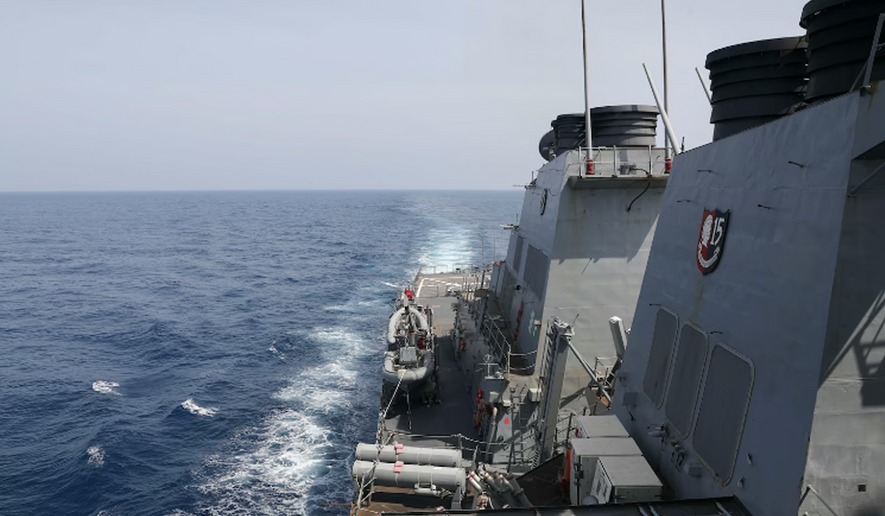A U.S. Navy guided-missile destroyer sailed through the Taiwan Strait on Monday a week after Beijing announced its coast guard dispatched a large ship to inspect vessels in the disputed waterway.
The destroyer operation also came a week after China’s military held three days of large-scale military war games around Taiwan that state media described as practice for a future military operation against the democratic-ruled island state.
The destroyer, the USS Milius, carried out the Taiwan Strait operation fresh from a similar “freedom of navigation operation” further south in the South China Sea, sparking a fresh complaint from Beijing. The U.S. and its allies regularly conduct such trips to challenge China’s aggressive territorial claims in Taiwan and throughout the region.
The destroyer conducted a routine transit “through waters where high-seas freedoms of navigation and overflight apply in accordance with international law,” said a spokesman for the Navy’s Seventh Fleet, Lt. Luka Bakic. “The ship transited through a corridor in the Strait that is beyond the territorial sea of any coastal state.”
China in June 2022 declared the Taiwan Strait to be its territorial waters, a claim rejected by the State Department. The U.S. considers the strait constitutes international waters despite the Chinese announcement.
The Chinese military hailed the Milius during its voyage through the 100-mile-wide strait, but did not result in the destroyer altering course, Lt. Bakic said.
“All communications between ships and/or aircraft were consistent with international norms and did not impact the operation,” he said. “U.S. military vessels and aircraft routinely interact with foreign warships and aircraft while operating throughout the region. All interactions with foreign military forces during the transit were consistent with international norms and did not impact the operation.”
China has kept up the military pressure on Taiwan even after the drills — held in the wake of a meeting between Taiwanese President Tsai Ing-wen and U.S. House Speaker Kevin McCarthy — were concluded. Taiwan’s defense ministry said Monday that 18 Chinese military aircraft and four naval vessels had been spotted operating around Taiwan over the previous 24-hour period.
The official Chinese military publication PLA Daily reported on April 10 that a Chinese coast guard vessel Haixun 06 conducted a three-day patrol of the Taiwan Strait and inspected shipping in the central and northern parts of the waterway.
The ship “inspected container routes of direct shipping from the mainland’s Pingtan to Taiwan region, passenger routes of the ‘mini-three links,’ customary shipping routes in Taiwan Straits, and some waters where commercial and fishing vessels often concentrate and illegal sand mining activities often occur,” the newspaper said, quoting the Fujian Maritime Safety Administration said.
Those operations “further smoothed the shipping environment in the Taiwan Straits,” the outlet said.
The operations of the Haixun 06 included cracking down on illegal nighttime sand mining and guarding a passenger ship in the strait. The 419-foot-long ship is described by China as a “law enforcement” vessel and conducted the inspection operations from April 7 to April 10.
Military analysts said the Haixun operations were the latest action by China in seeking to coerce and intimidate Taiwan. According to the analysts, inspecting routes in the strait involves questioning all craft encountered about their activities, cargo, destinations and concerns, although it stops short of actual boarding.
“This reported activity sends a not-so-subtle message to Taipei that its links to its coastal islands depend on PRC goodwill,” said a former military intelligence official, using the acronym for the People’s Republic of China.
In Moscow, meanwhile, Russian President Vladimir Putin met Chinese Defense Minister Gen. Li Shangfu on Sunday in a sign of growing military ties between the two states. Gen. Li arrived Sunday for a four-day visit to Russia amid U.S. concerns that Beijing will begin providing lethal aid to Russia for the war in Ukraine.
Gen. Li was targeted for U.S. sanctions in 2018 for his role in transactions with Russian state arms exporter Rosoboronexport, including Moscow’s delivery to China of Su-35 combat aircraft in 2017 and S-400 surface-to-air missile systems in 2018.
Chinese state media reported that Gen. Li told Mr. Putin that trust between the two nations’ militaries has been “increasingly consolidated,” CNN reported.
Gen. Li also said China is set to work with Russia to strengthen strategic communications between the two militaries.
The defense minister was appointed to the mainly ceremonial post in March and is also a member of the powerful Chinese Communist Party Central Military Commission, the ultimate power organ within the communist system.
• Bill Gertz can be reached at bgertz@washingtontimes.com.




Please read our comment policy before commenting.